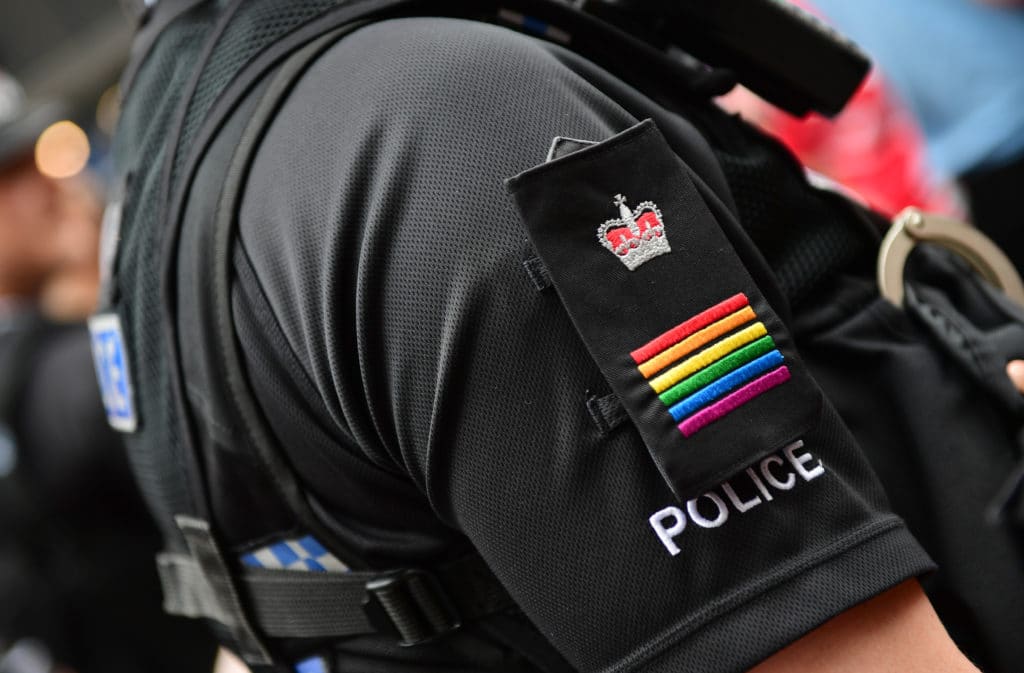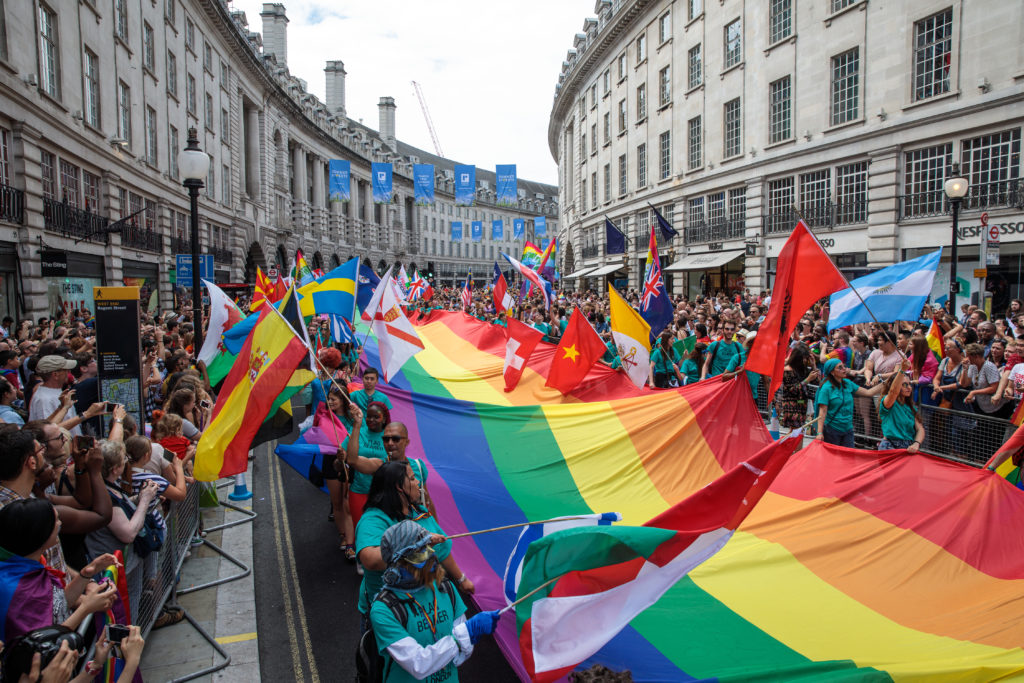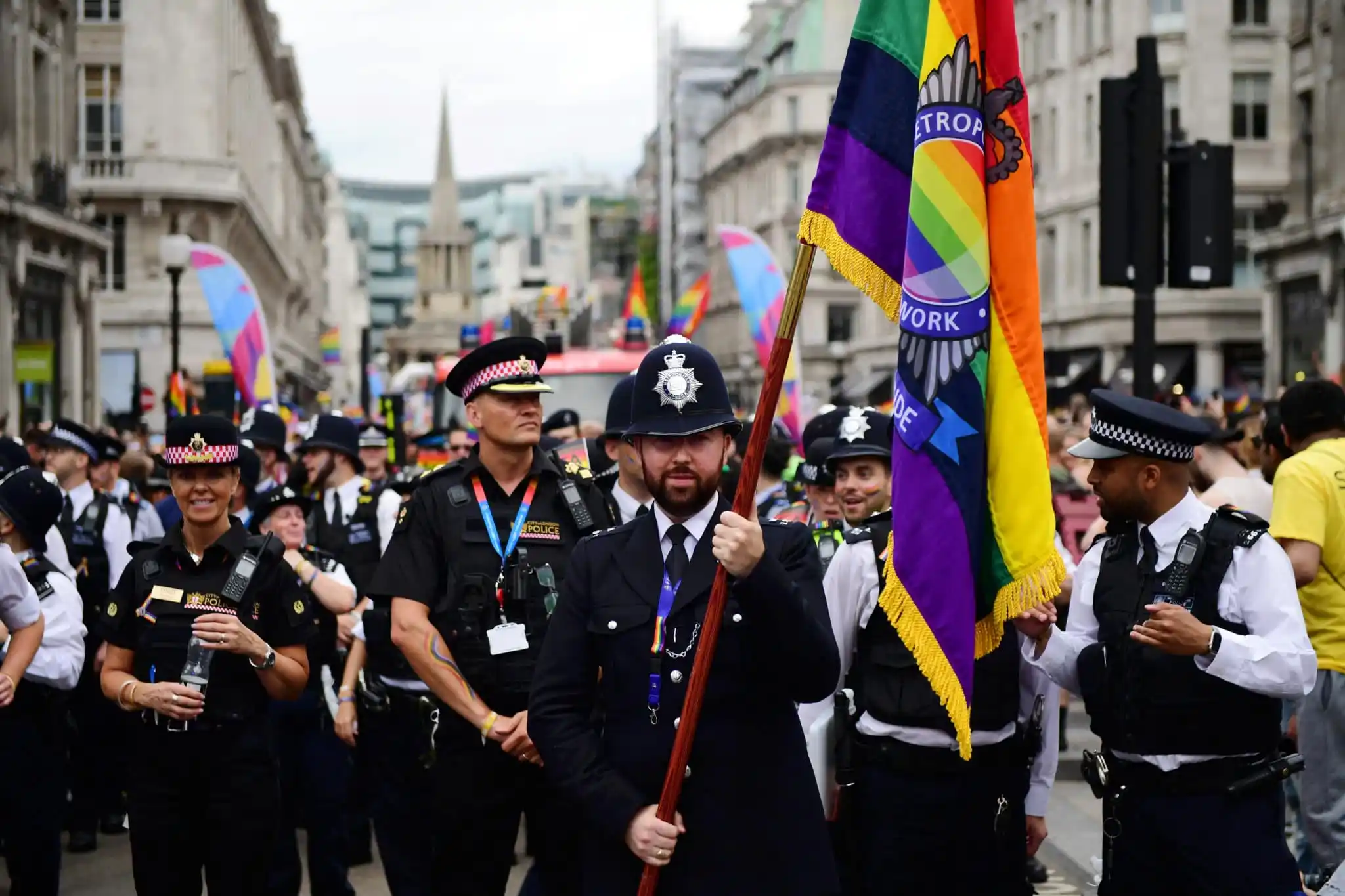Members of the police march at Pride in London 2019. (Chris J Ratcliffe/Getty)
One of Britain’s biggest LGBT+ Pride events, Pride in London, has “for now” rejected calls to ban the Metropolitan Police Service (MPS) from marching in the parade.
Board members had been considering barring the city’s top police agency from participating in Pride amid Black Lives Matter, with months-long nationwide protests against racial injustice roiling the country last summer.
The movement re-opened old wounds between LGBT+ people and the force and saw Pride in London organisers being flooded with hundreds of letters calling for the exclusion of the Met’s queer staff group, LGBT+ Network.
Pride in London has for years liaised with the Met and the mayor’s office for the event’s security, with LGBT+ Network marching in the main parade.
Despite the drumbeat of criticism against the police’s involvement in the procession, Pride in London has moved to allow the police to apply to march in parades moving forward, as other groups must do, according to The Guardian on Friday (5 March),
The organisation in a statement reflected on how “mixed” the LGBT+ community is on the issue, stressing that “for now, it is better to work in an inclusive process with the MPS to bring the wider LGBT+ communities together”.
Pride in London urged to allow Met to march by most senior police officer
When Pride in London cancelled its 2020 event, citing the coronavirus crisis, its community advisory board mounted a sprawling weeks-long outreach campaign asking for feedback on how to reform the event in the wake of Black Lives Matter.
As organisers heard from the community, a Twitter campaign was launched that sought to stress the institutional racism pervasive within the police – an issue that even Met chiefs have acknowledged – and call for Pride in London to stonewall police participation in the parade.
Pride in London advisers recommended that the police not be allowed to march as a group in the parade, it is understood. Board members met with the Met, alongside the mayor’s office and London’s main governing body, the Greater London Authority, as part of discussions.
An indicative vote on enforcing the ban took place in December 2020 which was ratified earlier this year.

As board members prepared to vote, Metropolitan Police commissioner Cressida Dick urged officers be allowed to march in a letter.
“For us, Pride in London is something we have been proud to be at the centre of,” the letter read, according to the outlet.
“It is a celebration of our own LGBT+ officers and staff, colleagues and friends, and an important moment in our calendar.
“I understand that much of the discussion you have had with my colleagues has been focused on the Met’s relationship with London’s Black communities.
“As commissioner, I have two key priorities for the MPS: bearing down on violence, and increasing public confidence in the Met, particularly the confidence of Black communities.
“These have been my core areas of focus since the start of my commissionership, and they remain so.”
Organisers says queer community is ‘mixed’ on banning Metropolitan Police
Representatives of Pride in London told The Guardian that the result of its community outreach was “mixed”.
“Many were clear that exclusion would be the best way to show solidarity,” they told the newspaper.
“Others felt that exclusion of LGBT+ people from Pride did not align with the inclusive nature and values of Pride and also gives right-wing and racist groups an unwelcome platform, centring on the decision made and ‘Pride’s response’, rather than the lives and lived experiences of, in particular, Black people.

“We have concluded that, for now, it is better to work in an inclusive process with the MPS to bring the wider LGBT+ communities together, to raise, discuss, and address concerns and to work towards bringing about the institutional and systemic change that is required to ensure that policing in our great city is equitable.”
A spokesperson for Sadiq Khan, the mayor of London, said: “The mayor welcomes Pride in London’s decision to allow the Metropolitan Police to apply for the next parade.
“The mayor is determined to do all he can to tackle all forms of discrimination across London and recently published an action plan designed to improve the trust and confidence of Black communities in the police.
“The mayor believes all LGBT+ Londoners should be able to march in Pride and it is right that LGBT+ police officers and police staff can participate in the parade – as they do every year.”
This is not the first time that Pride in London has been a hot-button issue among LGBT+ groups, with the country’s largest queer rights group Stonewall pulling out of the parade in 2018 over Pride in London’s failure to involve queer Black communities.
From Wisconsin, US, to Toronto, Canada, Pride organisers banning uniformed police officers from taking part in parades is in no way uncommon. Supporters often cite the police force’s historical discrimination towards trans people and people of colour.
